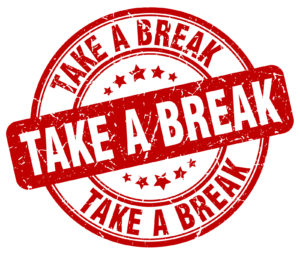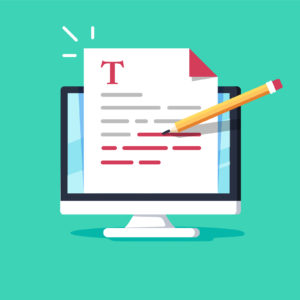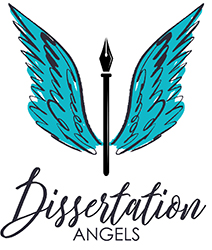Writer’s block (noun): a psychological inhibition preventing a writer from proceeding with a piece.
“Writer’s block” is a common phrase we use to describe that jammed up feeling that every writer experiences at some point; it’s that frustrating space where no matter how hard you try, you can’t seem to get any words on paper.
Often, we blame writer’s block on a lack of inspiration or creativity, which may certainly be the case for a bestselling novelist coasting on the royalties of his last book as he sits behind his computer somewhere in the French countryside, struggling to figure out the plot of his next manuscript.
But for Ph.D. candidates working on their dissertations, the cause of writer’s block is less likely to be a lack of creative inspiration, and more likely to be stress.
How stress screws us up
Stress over deadlines. Stress over the last round of incoherent babble your chair sent back as “feedback” on your proposal. For online students, stress over the time delays in communication. Stress over committee members with opposing ideas about how your study should look. Stress over the tuition you have to keep paying each term just to stay enrolled in a program. And that doesn’t even touch on outside stress related to work, family, and finances.
It’s no wonder that the brains of Ph.D. candidates freeze up.
Stress does some wacky things to our brains. The physiological reaction to stress activates the “fight-or-flight” response and triggers the hypothalamo-pituitary-adrenal (HPA) systems (Radley et al., 2015). Glucocorticoids, which are produced during stress, help your body meet changing energy needs during stress (like being chased by a bear or sitting down to do your taxes). These guys also influence responses from other body systems and actually help increase cognitive function, for brief periods. In short, glucocorticoids can help you manage acute stress. Yay!

But prolonged elevation to glucocorticoid levels from chronic stress is another story. Left floating around in your system because of chronic stress responses to things like writing a dissertation, these babies can wreak havoc on your body and lead the development of all kinds of gnarly illnesses (you many have heard of some of them – cardiovascular disease, sleep apnea, high blood pressure, type 2 diabetes… and on…).
Chronic stress also jacks up our cognitive function. Much of the research on chronic stress has been conducted in animal-based studies because of the challenges associated with inducing, isolating, and assessing chronic stressors in humans. But research on rats shows that (surprise, surprise) chronic stress can seriously inhibit your ability to focus and think.
In short, we know that chronic stress can be a major impediment (or even the death knell) to completing a dissertation. So what’s a stressed out doc student to do? The answer is actually simpler than you may think, especially if you’re currently riding the stress train. There are two steps.
- Take a break.
- Get some help.
Take a break
I cannot stress this enough (no pun intended). As someone who has a hard time taking a break when my brain is fizzling out, I understand feeling the need to “push through” when you’re hitting the wall. “This dissertation isn’t going to write itself,” you tell yourself. And while that’s true, neither are you as long as you’re burnt out. In fact, continuing to stare at the same three sentences you wrote in your Word document five hours ago is going to do absolutely nothing to help you finish.
Instead, take a break. Shut the laptop, go for a walk, have dinner with a friend – do something to take your mind completely off of your dissertation. However, do not go to dinner with a friend and talk their ear off about your current writing crisis. Don’t go for a walk and stew on those three sentences you can’t seem to move past. Get away, think about something different. Clear your head.

When you take a break, you come back refreshed. Sometimes the idea you needed to help you move past your block will just magically appear. But in order for that to happen, you have to allow yourself to get out of that state of stress and reactivity, take a breath, regroup, and then come at it again.
Just a quick note on taking a break: make sure you keep it short. Step away for a few hours or days, but don’t let this break turn into a hiatus. You’re not going on sabbatical here, you’re just giving your weary little brain the chance to take a break. Give yourself permission to take a break to get it back together – don’t give yourself permission to walk away indefinitely.
The goal is for you to come down from that nasty stressful place and relax a bit so that when you do return to your computer, you feel better, you can focus, and you’re able to get some work done around here.
Get some help

Sometimes, you need a little help. Maybe academic writing isn’t your strength. If it isn’t, you’re probably awesome at math or science, or are excellent at communicating in conversation. Look, we all have our strengths… and weaknesses. It’s what makes the world go round! So don’t feel bad about reaching out for help if you’re feeling in over your head with some aspects of your dissertation. Perhaps you need some guidance navigating the feedback you’re receiving from your chair or methodologist. Maybe you’re at the beginning stages and are struggling to form some damn research questions already.
We aren’t all aces at everything – and you’ll save yourself a lot of headache, frustration, and money if you get help in the areas where you’re not already a Rockstar. In the dissertation arena, there are a few different types of help available to you. They come in the form of:
- Editors
- Analysts
- Coaches
Editors

This may seem self-explanatory, but a great academic editor can do a lot more than just make sure your periods and commas are in the right places. They’re experts in APA and Microsoft Word, and can help make sure your document is perfectly formatted. They can easily do all the mind-numbing stuff, like setting up an automatic table of contents, fixing your pagination, making sure all of your references are error-free, or conducting an audit of your citations and references to ensure you’re not missing anything. A great editor may also help you handle the comments and feedback you’re receiving and is experienced enough to read between the lines when feedback isn’t very clear (ever had the pleasure of reading feedback and wondering how many jack and cokes your chair had beforehand?).
If you need some help polishing up your work or if you’re at the point where receiving feedback leaves you feeling overwhelmed and stressed, get an editor.
Just a word of caution about hiring editors and consultants – there are a lot of scammers out there who claim to be experts at academic writing and editing… but aren’t. Check out my article on that, here.
Analysts

Ahhhhhh, data analysis. So, you’ve gone out and collected all your data and are excited to see what the analysis reveals. High five!
But there’s one problem – you’re not an analyst.
Most online Ph.D. programs provide students with little-to-no training on data analysis, so the process of analyzing data can be understandably overwhelming. This is where an analyst can come to the rescue. Whether you’ve gone quantitative, qualitative, or mixed method, an analyst can swoop in and help you make sense of your data. Quantitative analysts are experts with statistics and software packages such as SPSS and SAS. Qualitative folks, on the other hand, are pros at textual and thematic analysis, and are able to use programs such as NVivo and ATLAS.ti. If you’re staring at a mountain of transcribed interview data and are feeling overwhelmed with coding or theme development, it might be a good idea to bring a qualitative analyst on board.
Coaches

Finally, if you’re struggling with the often-lonely dissertation journey, a dissertation coach might be the answer. The coaching piece is so important that I’m going to write a separate post about it, but I’ll give you the short version here. A dissertation coach can help you in a few critical areas:
- Keeping you on track
- Helping you interpret feedback and navigate the entire dissertation process
- Keeping you off the ledge
Think about it – people hire coaches to help them achieve just about any goal. From getting into killer shape, to making business decisions, to rescuing failing relationships – coaches can help you zero in on your goal, create an action plan, help you execute that plan, and hold you accountable.
In an ideal situation, your dissertation chair should be acting as a coach. Unfortunately, that is less often the case, especially in online doctoral programs where professors may be chairing as many as 20 students (that’s right… 20). In these cases, chairs may lack the time to give you the detailed assistance you need. This becomes evident when you start getting conflicting feedback on different submissions of a proposal chapter, or if the comments are incoherent, or if your chair asks you to do something that conflicts with your school’s templates and handbooks.
If you’ve found yourself in the above scenario, you know how incredibly frustrating it can be. The process can also leave you feeling like you’re on an island by yourself. If this is you, a coach might be an excellent investment. Not only can a seasoned coach help reduce your stress, navigate feedback, plan or an anticipate each subsequent step in the dissertation process, but a coach can also save you a lot of money in the long-term. While the costs associated with dissertation courses vary from school to school, none of them are cheap. If it takes you 3 years to get through the dissertation on your own, the amount you spend toward the dissertation is 3 times as much as if you’d hired a coach to help get you through in 1 year.
Yes, coaches are an investment, but the right one will save you a boatload of money and stress.
In summary…
I know, I know. Enough already. This is already one of the longest damn posts I’ve written for this site. I just want to close with this – the dissertation process is understandably stressful, but it shouldn’t rob you of your sleep at night. It is so important to keep your balance and perspective throughout the process. Grant yourself some grace, take breaks, and reach out for help when you need it.
Onward!
Reference
Radley, J., Morilak, D., Viau, V., & Campeau, S. (2015). Chronic stress and brain plasticity: Mechanisms underlying adaptive and maladaptive changes and implications for stress-related CNS disorders. Neuroscience & Biobehavioral Reviews, 58, 79–91. doi:10.1016/j.neubiorev.2015.06.018
